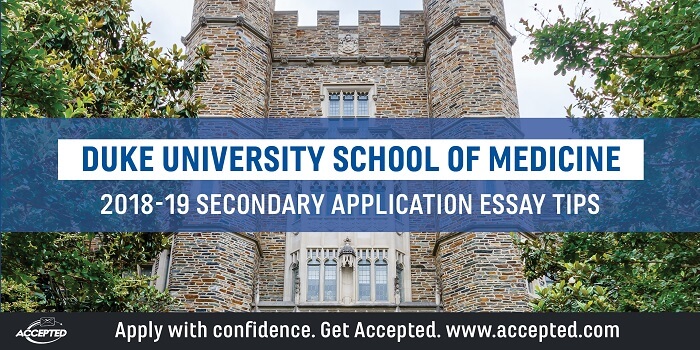
Duke University School of Medicine’s 2018-19 Secondary Application Tips:
• Applicants should use single-spacing and 12-point font.
• Be sure you do not repeat examples in the different essays.
• Be sure you do not repeat examples in the different essays.
Duke University School of Medicine Secondary Application Essay #1
Tell us more about who you are. You may provide additional information that expands your self-identity where gender identification, racial and/or ethnic self description, geographic origin, socioeconomic, academic, and/or other characteristics that define who you are as you contemplate a career that will interface with people who are similar AND dissimilar to you. You will have the opportunity below to tell us how you wish to be addressed, recognized and treated. (500 words)
This is a new prompt for Duke this year. As schools are taking more factors into consideration when it comes to diversity, they are also asking applicants to put more thought into the relationship between diversity (of patients and colleagues) and identity. This is one such question. You should feel free to talk about aspects of your identity that might not be obvious from your application. I suggest doing so through the use of examples in order to illustrate how those parts of your personality inform your behavior towards others. You should also explain how these qualities or experiences will impact how you treat and interact with others.
Duke University School of Medicine Secondary Application Essay #2 (Optional)
In addition to the broad categorization of race, ethnicity, geographic origin, socioeconomic status as provided through your AMCAS application, you may use the text box below to provide additional clarifying information that may reflect the impact of any of these parameters on your development thus far as well as the impact that these may have had on your path to a career in medicine and your plans for the future. (200 words)
This question is asking you to talk about how your own background — race, ethnicity, class and hometown — have impacted your life. You should talk about how any of these things affected your path to medical school and why that is important in terms of your development. Be sure not to repeat the response from Question 1.
Duke University School of Medicine Secondary Application Essay #3
Describe the community in which you were nurtured or spent the majority of your early development with respect to its demographics. What core values did you receive and how will these translate into the contributions that you hope to make to your community as a medical student and to your career in medicine? What improvements do you think might make the described community better? (500 words)
This question asks you to look at your own background and examine your values. Make a list of the communities to which you belong and what you have learned from each one. Then, ask yourself how these lessons apply to your motivation to pursue medicine. Finally, step back and look critically at the big picture – how does your community fit into the larger scope of the world? What can you say about your own community with some objective perspective and informed outlook that would improve it?
When you are thinking about answering questions 1-3, make sure that your responses complement each other. Each asks you to explore different facets of your identity and values.
Duke University School of Medicine Secondary Application Essay #4
Describe a situation where you have chosen to advocate for someone who is different from yourself. What does advocacy mean to you and how has your advocacy developed? How do you see it linked to your role as a physician/leader? What risks, if any, might be associated with your choice to be an advocate? (500 words)
For this prompt, make a list of times you have either helped someone express his or her needs or obtain a needed service or acknowledgement. The prompt asks for an individual example, but you can also think about an individual you have worked with who represents a broader group of people. This question is asking you to think about your role as a physician-advocate, someone who will represent her patient in the quest to obtain fair and adequate healthcare. The question also addresses Duke’s emphasis on the physician as a member of the community with a duty to improve care for all.
Duke University School of Medicine Secondary Application Essay #5
What has been your most humbling experience and how will that experience affect your interactions with your peers and patients? (500 words)
This prompt requires that you address an experience where things did not go as planned OR an example where you learned or gained some insight from another person whom you may have underestimated. You should give an example honestly while avoiding any response that implies you did something illegal or immoral. Your answer should emphasize what you did after this experience – how did you recover? What lesson did you learn? What would you do differently next time?
Duke University School of Medicine Secondary Application Essay #6
Describe a situation where you failed. What did you learn from the experience? Describe at least one functional impact of the experience. (500 words)
Here, the AdCom wants to know how you accept failure and what you do about it. The failure can be personal or professional (avoid anything immoral or cruel, of course). When you are responding to this kind of prompt, don’t shy away from admitting you have failed or made mistakes, and never write that you haven’t failed. The most important part of the essay is what you learned. Here, avoid trite lessons, like “I learned how to be persistent,” and, instead, really think about the incident in terms of emotional and intellectual growth. These types of questions are trying to get at your resilience and maturity as a person.
Duke University School of Medicine Secondary Application Essay #7
Critical thinking involves many aspects including curiosity, comprehension, application and analysis. Describe a time when you have utilized critical thinking. How do you anticipate critical thinking being used as part of your career? (400 words)
To answer this question, you should make a list of the ways in which you use critical thinking. Then, think of a specific application, taking care not to repeat the same examples from other essays. You should consider your academic, professional, volunteer and personal life. Research frequently provides opportunity for critical thinking and could be an excellent option for this essay. Explain how you used critical thinking in your specific example. To conclude the essay, you should discuss how this would apply to medicine.
Duke University School of Medicine Secondary Application Essay #8
Many view medical care as an undeniable right. What responsibility does the medical profession have in taking care of all persons? (400 words)
This question is asking you to consider the societal implications of being a physician in the world. The temptation is to answer this question very broadly. Instead, think of where you hope to practice medicine, and then explain through the use of specific examples, what the responsibility of doctors is in that setting. You can draw on information you have gleaned from work or volunteering; you can also write about what you observed while shadowing or what you learned from a mentor or another doctor you admire.
Duke University School of Medicine Secondary Application Essay #9 (Optional)
Please let us know of any additional information that you would like us to consider while reviewing your application. (500 words)
This question is optional. You can use it to discuss “why Duke,” since there’s no other place to do so. You can also write about another topic that you have not covered above. Another option is to write about what you plan to do over the next year if you are taking a gap year, or any updates to your application.
If you would like professional guidance with your Duke University School of Medicine application materials, check out Accepted’s Medical School Admissions Consulting and Editing Services, which include advising, editing, and interview coaching for Duke’s application materials.
Duke University School of Medicine 2018-19 Application Timeline:
2nd week of July until October 15 (11:59 PM EST)
*Strong recommendation: Submit within two weeks after receipt.- Duke receives completed and verified AMCAS applications.
- The second week of July Duke sends invitations to complete the DukeMed Supplemental Application.
- Duke receives DukeMed Supplementary Applications.
- Duke University School of Medicine screeners review applications.
- Qualified applicants are invited to interview with Duke.
- Interview season. (Interview dates are subject to change as the calendar changes each admission cycle).
***Disclaimer: Information is subject to change. Please check with individual programs to verify the essay questions, instructions and deadlines.***
Jessica Pishko graduated with a J.D. from Harvard Law School and received an M.F.A. from Columbia University. She spent two years guiding students through the medical school application process at Columbia’s Postbac Program and teaches writing at all levels. Want Jessica to help you get accepted? Click here to get in touch!
Related Resources:
• Med School Secondary Essay Handbook: School Specific Tips, a free guide
• 3 Tips for Writing the Optional Essay in Medical School Secondary Applications
• Successful Medical School Secondary Application Strategies
This article was originally posted on blog.accepted.com.• 3 Tips for Writing the Optional Essay in Medical School Secondary Applications
• Successful Medical School Secondary Application Strategies
Applying to medical school? The talented folks at Accepted have helped hundreds of applicants like you get accepted to their dream programs. Whether you are figuring out where apply, working on your AMCAS application, working on secondary essays, or prepping for your interviews, we are just a call (or click) away. Contact us, and get matched up with the consultant who will help you get accepted!
